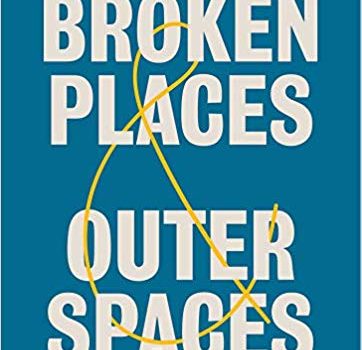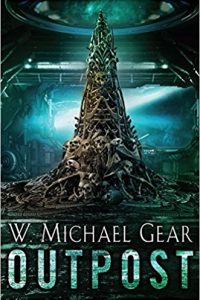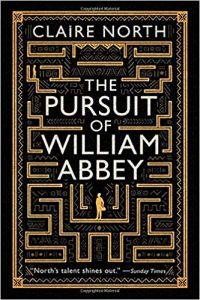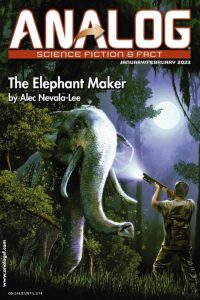Gary K. Wolfe Reviews Broken Places & Outer Spaces by Nnedi Okorafor
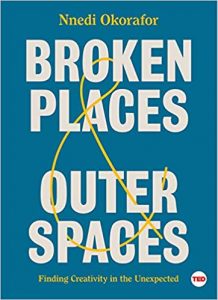 Broken Places & Outer Spaces: Finding Creativity in the Unexpected, Nnedi Okorafor (Simon & Schuster 978-1-5011-9547-2, $16.99, 96pp, hc) June 2019.
Broken Places & Outer Spaces: Finding Creativity in the Unexpected, Nnedi Okorafor (Simon & Schuster 978-1-5011-9547-2, $16.99, 96pp, hc) June 2019.
Nnedi Okorafor’s surprisingly and sometimes achingly personal account of her battle with scoliosis and post-surgical paralysis, Broken Places & Outer Spaces, isn’t exactly a literary memoir, but one anecdote strikes me as ironically emblematic of her unique relationship with SF: when she was hospitalized, she was given an old paperback copy of Asimov’s I, Robot. It would be more than a decade before she actually read it, but she began scribbling in the margins, “around the printed words of Isaac Asimov” – not commenting on the stories, but rather beginning to invent stories of her own. Since then she’s had an almost meteoric career, still writing in the margins of traditional SF, adding her own voice and cultural perspective to a genre that used to know what its classics were supposed to be. She does mention some literary influences, mostly horror writers, and lists King & Straub’s The Talisman as an early favorite, but says she didn’t discover writers like Butler and Le Guin until her own writing career was well underway.
Mostly, though, she offers a heartfelt account of her childhood encounters with racism in a working-class suburb of Chicago (where her speed and strength became survival tools), her promising adolescent career as a tennis and track-and-field star, and the sudden end to that career due to the scoliosis which also plagued her siblings, though her own case was by far the worst. She calls this the Breaking, and suggests that it had a good deal to do with her self-discovery as a writer, as opposed to the entomologist she’d once hoped to be. She also briefly speculates that a similar sort of breaking might have influenced the careers of Frida Kahlo and Mary Shelley. What may be of more interest to Okorafor readers are bits that suggest her own later work. When she first learns of her paralysis, her rage is such that “The room should have looked like a tornado had ripped through it. Everyone’s hair should have been blown about. Some of the residents should have been dead, dashed violently against the battered walls.” It’s a stunning description of the power of anger and frustration, and we can see echoes of it in later scenes from Who Fears Death? to The Book of Phoenix. She describes writing a Marvel comic in which a disabled Nigerian girl “joins forces with an alien symbiotic organism to become a shape-shifting superhero”; “the strong will she uses to control the symbiote is one she developed while learning to live in a world in which she was disabled.” There are obviously a lot of additional factors that have shaped Okorafor’s career as a writer, and she alludes to several of them in passing, but Broken Places & Outer Spaces gives us a pretty good sense of where those determined and resourceful women in her fiction really came from.
Gary K. Wolfe is Emeritus Professor of Humanities at Roosevelt University and a reviewer for Locus magazine since 1991. His reviews have been collected in Soundings (BSFA Award 2006; Hugo nominee), Bearings (Hugo nominee 2011), and Sightings (2011), and his Evaporating Genres: Essays on Fantastic Literature (Wesleyan) received the Locus Award in 2012. Earlier books include The Known and the Unknown: The Iconography of Science Fiction (Eaton Award, 1981), Harlan Ellison: The Edge of Forever (with Ellen Weil, 2002), and David Lindsay (1982). For the Library of America, he edited American Science Fiction: Nine Classic Novels of the 1950s in 2012, with a similar set for the 1960s forthcoming. He has received the Pilgrim Award from the Science Fiction Research Association, the Distinguished Scholarship Award from the International Association for the Fantastic in the Arts, and a Special World Fantasy Award for criticism. His 24-lecture series How Great Science Fiction Works appeared from The Great Courses in 2016. He has received six Hugo nominations, two for his reviews collections and four for The Coode Street Podcast, which he has co-hosted with Jonathan Strahan for more than 300 episodes. He lives in Chicago.
This review and more like it in the October 2019 issue of Locus.
 While you are here, please take a moment to support Locus with a one-time or recurring donation. We rely on reader donations to keep the magazine and site going, and would like to keep the site paywall free, but WE NEED YOUR FINANCIAL SUPPORT to continue quality coverage of the science fiction and fantasy field.
While you are here, please take a moment to support Locus with a one-time or recurring donation. We rely on reader donations to keep the magazine and site going, and would like to keep the site paywall free, but WE NEED YOUR FINANCIAL SUPPORT to continue quality coverage of the science fiction and fantasy field.


